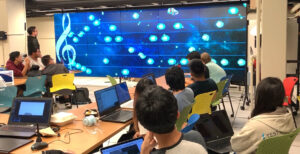Prerequisites
Core courses cover the fundamentals of electrical and computer engineering, while upper level technical elective courses allow students to pursue their specific technical interests. The program emphasizes hands-on education with state-of-the-art equipment and software tools. There are three required project courses, one each at the sophomore (EE 296), junior (EE 396), and senior (EE 496) levels.
In the Electrical Engineering program, the electives are divided into two major areas or Tracks:
- Electrophysics Track
- antennas, circuit/device designs, electromagnetic, electronics, fabrication, microwave engineering, optics, solid-state devices, and sensors.
- Systems & Data Science Track
- control, data science, convolutional neural networks, machine learning, optimization, pattern recognition, signal/image processing, and telecommunications.
Electrical Engineering program students may also opt to take a select set of courses to receive a concentration in
- Biomedical Concentration
- Energy Concentration
Core Requirements
Each of the curricula offered by the College of Engineering provides a fundamental science-oriented university education with coverage of communications, the humanities, and social sciences, as well as the basic physical sciences of mathematics, physics, and chemistry. The curricula also encompass engineering sciences common to all engineering disciplines and project courses that introduce the engineering method of design.
Course work in each curriculum consists of a set of required courses common to all engineering majors and additional courses to satisfy departmental requirements. The college participates actively in UH Mānoa Honors Program. The courses required of all engineering students, which also satisfies the General Education Core Requirements of UH Mānoa, consist of the following credits:
Written Communication
ENG 100 – Composition I (3) (FW) or approved FW course
Arts, Humanities and Literature
COMG 251 – Principles of Effective Public Speaking (3) (DA)
One elective (3) (DH or DL)
Social Sciences
ECON 120 – Introduction to Economics (3), ECON 130 – Principles of Microeconomics (3), or ECON 131 – Principles of Macroeconomics (3) (DS)
One elective (3) (DS)
Global and Multicultural Perspectives
Two approved FG electives (6)
Symbolic
MATH 241 – Calculus I (4) (FS)
MATH 242 – Calculus II (4)
MATH 243 – Calculus III (3)
MATH 244 – Calculus IV (3)
or
MATH 251A – Accelerated Calculus I (4)
MATH 252A – Accelerated Calculus II (4)
MATH 253A – Accelerated Calculus III (4)
Natural Sciences
CHEM 161/161L, and CHEM 162 – General Chemistry/Lab (3/1/3) (DP/DY)
or
CHEM 171/171L – Principles of Chemistry (4/1) (DP/DY)
or
CHEM 181/181L – Principles of Chemistry (4/1) (DP/DY)
and
PHYS 170/170L – General Physics I/Lab (4/1) (DP/DY)
PHYS 272/272L – General Physics II/Lab (3/1) (DP/DY)
Additionally, a student must complete the Focus Graduation Requirements: one H, one E, one O, and five W courses. The Hawaiian or Second Language is not required for the engineering degree.
Electives
There is a requirement of a minimum of 6 credit hours of technical electives. They may be all from the following list of EE and ICS courses. Alternatively, they may be composed of 3 credit hours from the list and 3 credit hours of an EE course that is at the 300 level or higher.
EE 344 Network I (or ICS 451)
EE 406 Introduction to Computer and Network Security
EE 449 Computer Communication Networks (or ICS 451)
EE 461 Computer Architecture (or ICS 431)
EE 467 Object Oriented Software Engineering
EE 468 Introduction to Operating Systems (or ICS 412)
EE 469 Wireless Data Networks
EE 491 Special Topics in Electrical Engineering (E, F, G)
ICS 311 Algorithms
ICS 313 Programming Language Theory
ICS 321 Data Storage & Retrieval
ICS 413 Software Engineering I
ICS 414 Software Engineering II
ICS 415 Introduction to Programming for the Web
ICS 421 Database Systems
ICS 424 Application Frameworks
ICS 425 Computer Security and Ethics
ICS 426 Computer System Security
ICS 432 Concurrent and High-Performance Programming
ICS 441 Theory of Computation
ICS 442 Analytical Models and Methods
ICS 461 Artificial Intelligence I
ICS 464 Human Computer Interaction I
ICS 465 Introduction to Hypermedia
ICS 466 Design for Mobile Devices
ICS 469 Introduction to Cognitive Science
ICS 481 Introduction to Computer Graphics
Note that ICS courses from the list may have prerequisite courses that are not part of the computer engineering curriculum. These courses used as technical electives will lead to more credit hours to complete the program.























